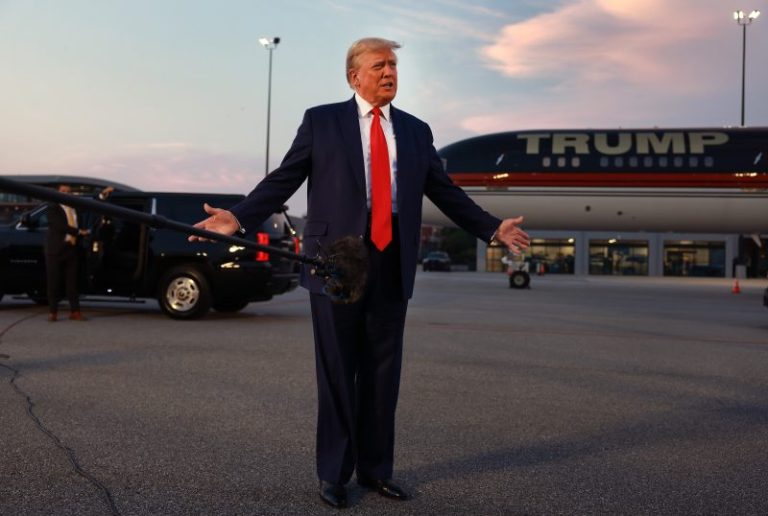A federal judge has reimposed limits on former president Donald Trump’s public statements in advance of his trial on charges of conspiring to subvert the results of the 2020 election.
U.S. District Judge Tanya S. Chutkan on Sunday evening put back in place an order she had lifted nine days earlier to give Trump and U.S. prosecutors more time to argue whether the restrictions were unconstitutional, as attorneys for the former president had claimed. Trump can now ask a higher court for an emergency stay pending appeal, but in the meantime he is bound by Chutkan’s limits. If Trump violates the gag, as he did a similar order by a state judge in New York, Chutkan will have to decide how to punish the former president and leading presidential candidate.
A notice that Chutkan had denied Trump’s request that she stay the gag order throughout his appeal was posted on the electronic docket of the federal court in Washington at about 7 p.m. Sunday, but the judge’s underlying opinion and specific order were not immediately available on the computer system.
Under the existing order Trump and all interested parties in the case are barred from making or directing others to make public statements that “target” individual attorneys, witnesses, “any reasonably foreseeable witness,” or court staff involved in the case or the substance of their testimony. While the order was on hold, Trump posted a comment on social media calling special counsel Jack Smith “deranged” and saying former chief of staff Mark Meadows would be a lying coward if he testified for the prosecution. Both comments involved some of the exact type of language Chutkan deemed out of bounds.
Trump appeared to potentially to violate Chutkan’s order 75 minutes after she gave notice that it was reinstated, attacking his former attorney general and potential witness, William P. Barr.
“I called Bill Barr Dumb, Weak, Slow Moving, Lethargic, Gutless, and Lazy, a RINO WHO COULDN’T DO THE JOB,” Trump said in part of an 88-word post on his social media platform that both belittled the man he chose to serve as the nation’s top law-enforcement officer and exaggerated his crowd sizes. “So now this Moron says about me, to get even, ‘his verbal skills are limited.’ Well, that’s one I haven’t heard before. Tell that to the biggest political crowds in the history of politics, by far. Bill Barr is a LOSER!”
About 19 minutes after his post about Barr, Trump complained on social media: “The Corrupt Biden administration just took away my First Amendment Right To Free Speech.”
In other cases, violators of gag orders have gone to jail, but the logistics and political implications of imprisoning a former president and current presidential candidate make that unlikely. Trump is personally furious about the gag order, advisers told The Washington Post, but his campaign sees it as a political asset; any punishment would likewise feed into Trump’s narrative that he is a victim of government persecution. In New York, the judge overseeing Trump’s civil fraud trial has fined the ex-president $15,000 for repeated comments attacking a court clerk.
History of investigations involving Donald Trump
1/7
End of carousel
Trump “knows the effect of his targeting and seeks to use it to his strategic advantage while simultaneously disclaiming any responsibility for the very acts he causes,” prosecutors wrote in opposing the stay — “harassment, threats, and intimidation.”
They noted that Chutkan herself has received a death threat from a Trump supporter after being attacked online by Trump and that a Trump supporter went to the home of former president Barack Obama after Trump tweeted the address. Prosecutors also said Trump’s public criticism of Mike Pence on Jan. 6, 2021, was concerning enough that Secret Service agents protecting the vice president were notified.
Trump’s lawyers maintain that any court-imposed limits are unconstitutional suppressions of “core political speech” because “his reelection campaign … is inextricably intertwined with this prosecution and his defense.” Moreover, they say, his 100 million social media followers have a right to hear his point of view.
Chutkan rejected that argument in her ruling, saying he could criticize the prosecution as political and unfounded without personal attacks that could intimidate people involved in the case and mislead the public.
“Mr. Trump is a criminal defendant,” she said. “First Amendment freedoms do not allow him to launch a pretrial smear campaign against participating government staff, their families, and foreseeable witnesses.”
She singled out Pence, saying Trump could make “statements criticizing the campaign platforms or policies of [his] current political rivals” without getting into expected testimony. Pence had made his decision not to help overturn the election results on Jan. 6 part of his campaign, saying Trump betrayed the U.S. Constitution and endangered lives. Pence dropped out of the race this weekend.
Prosecutors said in their filings that in the five days it was in effect, the gag order was working. Trump posted to social media about 182 times in that period, repeatedly claiming that President Biden and the Justice Department were trying to silence him. “The Order … leaves him entirely free to do those things,” the government said.
A spokesperson for Trump did not immediately respond to a request for comment.
Isaac Arnsdorf contributed to this report.

